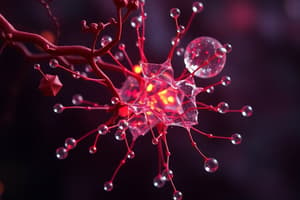Podcast
Questions and Answers
What is the primary focus of biology within the life sciences?
What is the primary focus of biology within the life sciences?
- Study of energy and matter interactions
- Study of living organisms and their interactions (correct)
- Study of celestial bodies
- Study of geological formations
Which step in the scientific method involves formulating a question?
Which step in the scientific method involves formulating a question?
- Analysis
- Observation (correct)
- Experiment
- Hypothesis
Which branch of science focuses on the study of weather patterns?
Which branch of science focuses on the study of weather patterns?
- Meteorology (correct)
- Chemistry
- Oceanography
- Geology
Which characteristic of science indicates that conclusions can be revised with new evidence?
Which characteristic of science indicates that conclusions can be revised with new evidence?
What is the purpose of conducting experiments in the scientific method?
What is the purpose of conducting experiments in the scientific method?
What does applied science primarily focus on?
What does applied science primarily focus on?
Which of the following best exemplifies the empirical nature of science?
Which of the following best exemplifies the empirical nature of science?
Which ethical consideration in science emphasizes honesty in research practices?
Which ethical consideration in science emphasizes honesty in research practices?
Flashcards are hidden until you start studying
Study Notes
Definition of Science
- A systematic enterprise that builds and organizes knowledge in the form of testable explanations and predictions about the universe.
Branches of Science
-
Physical Sciences
- Physics: Study of matter, energy, and the fundamental forces of nature.
- Chemistry: Study of substances, their properties, reactions, and the changes they undergo.
- Astronomy: Study of celestial bodies and the universe.
-
Life Sciences
- Biology: Study of living organisms, their structure, function, growth, and evolution.
- Ecology: Study of interactions among organisms and their environment.
-
Earth Sciences
- Geology: Study of the Earth’s solid material, including rocks and minerals.
- Meteorology: Study of the atmosphere and weather patterns.
- Oceanography: Study of oceans and marine environments.
-
Formal Sciences
- Mathematics: Study of numbers, quantities, shapes, and patterns.
- Logic: Study of reasoning and argumentation.
-
Applied Sciences
- Engineering: Application of scientific principles to design and build solutions.
- Medicine: Application of biological and physiological sciences to health and disease.
Scientific Method
- Observation: Gather data and notice phenomena.
- Question: Formulate a question based on observations.
- Hypothesis: Propose a testable explanation.
- Experiment: Design and conduct experiments to test the hypothesis.
- Analysis: Analyze the data collected from experiments.
- Conclusion: Draw conclusions based on the analysis.
- Communication: Share results with the scientific community.
Characteristics of Science
- Empirical: Based on observable evidence.
- Testable: Hypotheses must be testable and falsifiable.
- Repeatable: Experiments should yield consistent results when repeated.
- Predictive: Can make predictions about future events or phenomena.
- Tentative: Conclusions can be revised with new evidence.
Importance of Science
- Advances technology and innovation.
- Informs policy and decision-making.
- Enhances understanding of the natural world.
- Addresses global challenges (e.g., climate change, health crises).
Ethical Considerations in Science
- Integrity: Honesty in data reporting and research practices.
- Responsibility: Accountability for the impact of scientific research.
- Respect for subjects: Ethical treatment of living organisms and human subjects in research.
Definition of Science
- A systematic process for constructing knowledge that provides testable explanations and predictions about the universe.
Branches of Science
-
Physical Sciences: Encompasses the study of matter and energy, including:
- Physics: Analyzes fundamental forces and the nature of matter.
- Chemistry: Examines substances, their properties, reactions, and transformations.
- Astronomy: Investigates celestial bodies and the structure of the universe.
-
Life Sciences: Focuses on living organisms and their interactions, including:
- Biology: Studies the structure, function, growth, and evolution of living entities.
- Ecology: Explores the relationships between organisms and their environment.
-
Earth Sciences: Concerned with the Earth and its systems, including:
- Geology: Investigates solid materials of the Earth, such as rocks and minerals.
- Meteorology: Analyzes atmospheric conditions and weather phenomena.
- Oceanography: Studies oceanic systems and marine ecosystems.
-
Formal Sciences: Involves abstract concepts and theories, including:
- Mathematics: Deals with numbers, quantities, and patterns.
- Logic: Focuses on reasoning and argumentative structures.
-
Applied Sciences: Utilizes scientific principles to solve real-world problems, including:
- Engineering: Applies scientific knowledge to create technological solutions.
- Medicine: Uses biological and physiological understanding to address health issues.
Scientific Method
- Observation: Collect data and witness phenomena.
- Question: Develop inquiries based on gathered observations.
- Hypothesis: Formulate a testable statement to explain observations.
- Experiment: Plan and execute testing scenarios to validate the hypothesis.
- Analysis: Review and interpret experimental data.
- Conclusion: Summarize findings based on data analysis.
- Communication: Disseminate results to the scientific community for scrutiny and further research.
Characteristics of Science
- Empirical: Relies on observable and measurable evidence.
- Testable: Hypotheses must be confirmable or refutable.
- Repeatable: Experiments should yield similar outcomes upon replication.
- Predictive: Capable of forecasting future events based on current understanding.
- Tentative: Conclusions are open to revision with new evidence.
Importance of Science
- Facilitates technological and innovative advancements.
- Provides essential insights for policy formulation and decision-making.
- Deepens comprehension of natural phenomena.
- Tackles significant global challenges, such as climate change and pandemics.
Ethical Considerations in Science
- Integrity: Ensures honesty during research and data reporting.
- Responsibility: Holds researchers accountable for their findings' impacts.
- Respect for Subjects: Prioritizes ethical treatment of living organisms and human participants in studies.
Studying That Suits You
Use AI to generate personalized quizzes and flashcards to suit your learning preferences.



